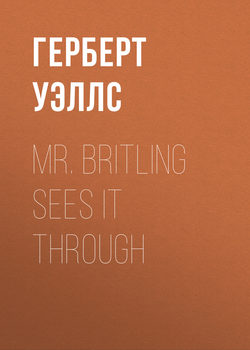Читать книгу Mr. Britling Sees It Through - Герберт Уэллс, Герберт Джордж Уэллс - Страница 15
BOOK I
MATCHING'S EASY AT EASE
CHAPTER THE SECOND
MR. BRITLING CONTINUES HIS EXPOSITION
§ 3
ОглавлениеThe park had a trim wildness like nature in an old Italian picture; dappled fallow deer grouped close at hand and looked at the two men fearlessly; the path dropped through oak trees and some stunted bracken to a little loitering stream, that paused ever and again to play at ponds and waterfalls and bear a fleet of water-lily leaves; and then their way curved round in an indolent sweep towards the cedars and shrubberies of the great house. The house looked low and extensive to an American eye, and its red-brick chimneys rose like infantry in open order along its extended line. There was a glimpse of flower-bright garden and terraces to the right as they came round the corner to the front of the house through a path cut in the laurel bushes.
Mr. Britling had a moment of exposition as they approached the entrance.
"I expect we shall find Philbert from the Home Office – or is it the Local Government Board? – and Sir Thomas Loot, the Treasury man. There may be some other people of that sort, the people we call the Governing Class. Wives also. And I rather fancy the Countess of Frensham is coming, she's strong on the Irish Question, and Lady Venetia Trumpington, who they say is a beauty – I've never seen her. It's Lady Homartyn's way to expect me to come in – not that I'm an important item at these week-end social feasts – but she likes to see me on the table – to be nibbled at if any one wants to do so – like the olives and the salted almonds. And she always asks me to lunch on Sunday and I always refuse – because of the hockey. So you see I put in an appearance on the Saturday afternoon…"
They had reached the big doorway.
It opened into a large cool hall adorned with the heads of hippopotami and rhinoceroses and a stuffed lion, and furnished chiefly with a vast table on which hats and sticks and newspapers were littered. A manservant with a subdued, semi-confidential manner, conveyed to Mr. Britling that her ladyship was on the terrace, and took the hats and sticks that were handed to him and led the way through the house. They emerged upon a broad terrace looking out under great cedar trees upon flower beds and stone urns and tennis lawns and yew hedges that dipped to give a view of distant hills. On the terrace were grouped perhaps a dozen people for the most part holding teacups, they sat in deck chairs and folding seats about a little table that bore the tea-things. Lady Homartyn came forward to welcome the newcomers.
Mr. Direck was introduced as a travelling American gratified to see a typical English country house, and Lady Homartyn in an habituated way ran over the points of her Tudor specimen. Mr. Direck was not accustomed to titled people, and was suddenly in doubt whether you called a baroness "My Lady" or "Your Ladyship," so he wisely avoided any form of address until he had a lead from Mr. Britling. Mr. Britling presently called her "Lady Homartyn." She took Mr. Direck and sat him down beside a lady whose name he didn't catch, but who had had a lot to do with the British Embassy at Washington, and then she handed Mr. Britling over to the Rt. Honble. George Philbert, who was anxious to discuss certain points in the latest book of essays. The conversation of the lady from Washington was intelligent but not exacting, and Mr. Direck was able to give a certain amount of attention to the general effect of the scene.
He was a little disappointed to find that the servants didn't wear livery. In American magazine pictures and in American cinematograph films of English stories and in the houses of very rich Americans living in England, they do so. And the Mansion House is misleading; he had met a compatriot who had recently dined at the Mansion House, and who had described "flunkeys" in hair-powder and cloth of gold – like Thackeray's Jeames Yellowplush. But here the only servants were two slim, discreet and attentive young gentlemen in black coats with a gentle piety in their manner instead of pride. And he was a little disappointed too by a certain lack of splendour in the company. The ladies affected him as being ill-dressed; there was none of the hard snap, the "There! and what do you say to it?" about them of the well-dressed American woman, and the men too were not so much tailored as unobtrusively and yet grammatically clothed.
